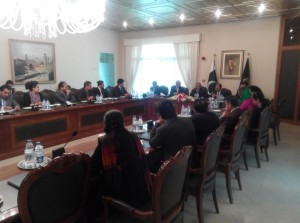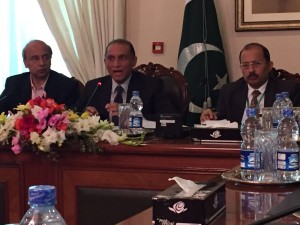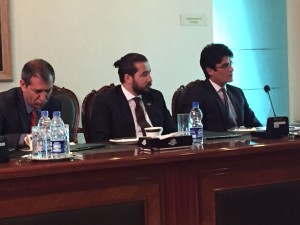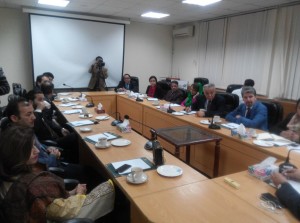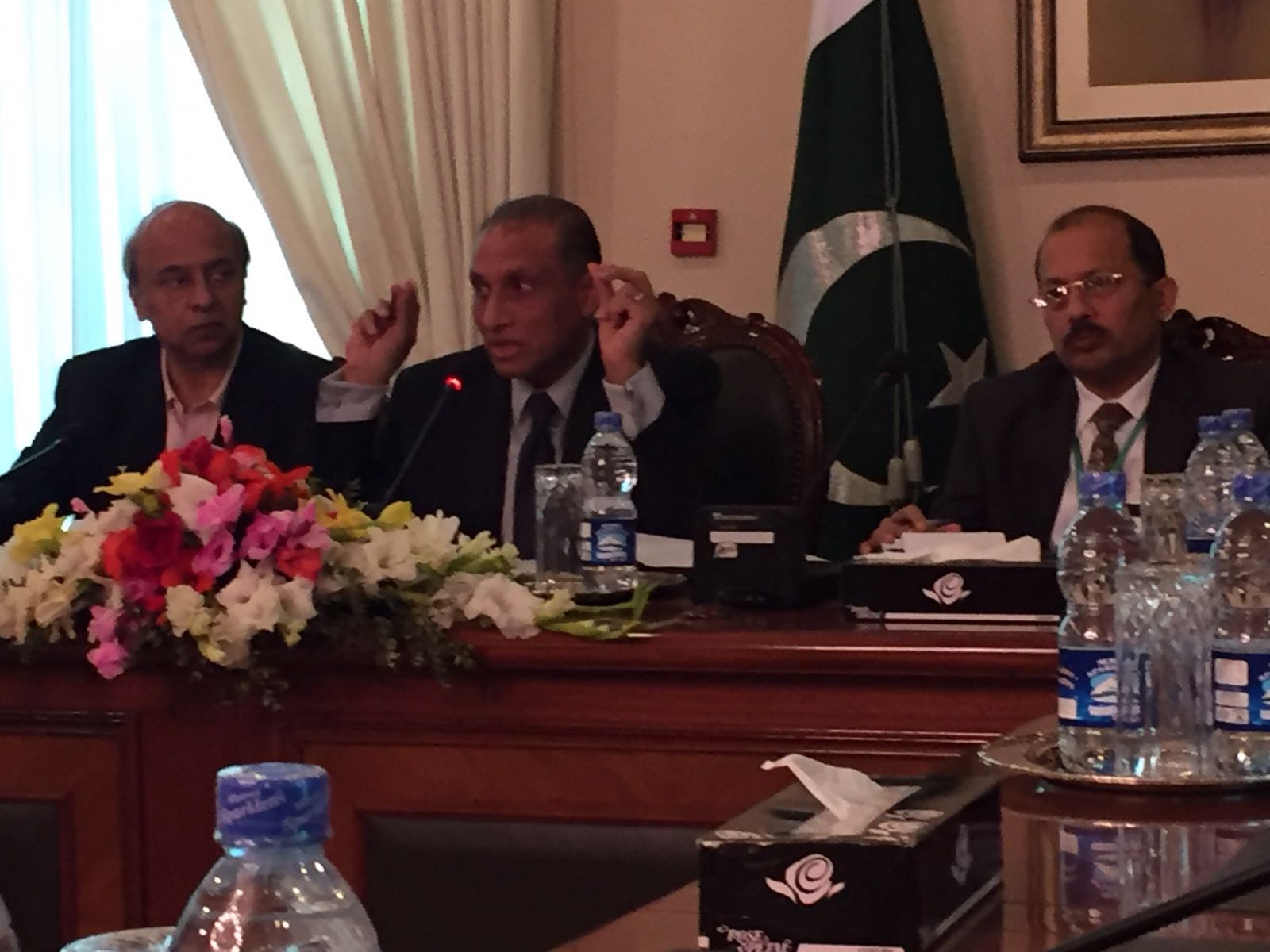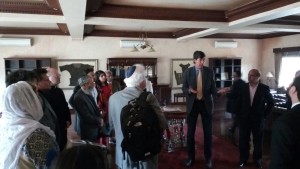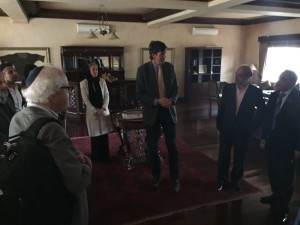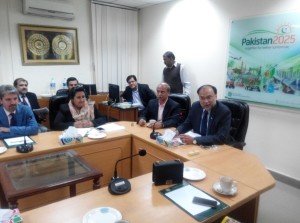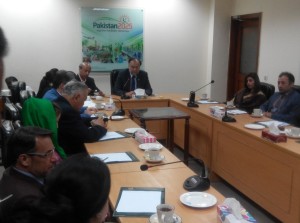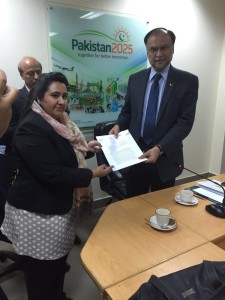Meeting with Foreign Secretary, Mr. Aizaz Ahmad Chaudhary, at the Ministry of Foreign Affairs
On Wednesday 10 February, 2016, 1n a meeting with the Afghan members of the civil society, who were visiting Pakistan as part of the Beyond Boundaries – Pak-Afghan Track II/1.5 initiative undertaken by Center for Research and Security Studies (CRSS), Pakistan’s foreign secretary Aizaz Ahmed Chaudhry said the speed with which the Quadrilateral Coordination Group (QCG) has moved reflects the commitment of all stakeholders to the Afghan peace and reconciliation. The chief diplomat said that Pakistan believes in a sovereign, united, prosperous, peaceful Afghanistan. This is in the interest of the entire region and that is why Pakistan together with the US and China is doing its best to help Afghans achieve the goal of peace and stability. “Hope and faith in the process as well as in Pakistan’s sincerity in the peace efforts will work better than continuous blame-game and skepticism”, Mr. Chaudhry added while underlining that you could inspire confidence only by staying positive.
With regard to peace process in Afghanistan, the foreign secretary said “We must, sequence the process and take a step-by-step approach rather than coming up with pre-conditions by either side in an extremely complex and difficult process”. Pointing to the aggravated security situation, factional divisions and emergence of Daesh, Mr. Chaudhry said these factors posed big challenge to the QCG process but hoped that given the resolve of all four countries, they were not insurmountable. “Pakistan has developed a complete national consensus to counter-terrorism. The state of Pakistan is determined to deal with all those militants across the board who are killing innocent women and children both in Pakistan and Afghanistan”, he told the visiting Afghan delegation.
The foreign secretary also gave the Afghan delegation a run-down of the QCG meetings held so far and hoped its concerted efforts would result in direct intra-Afghan talks sooner than later. In that context, he underscored that the positive messaging by all stakeholders was essential to help improve perceptions. This will also help the respective governments to move in tandem in the reconciliation process and neutralize the impact of spoilers. He also expressed the hope that the Afghan civil society and the media would play their role in making the peace efforts successful.
The head of the Afghan delegation, Ms. Samira Hamidi (Women and Human rights activist) requested that women representation should be ensured in the peace process during the QCG meetings, in reply the foreign secretary told her that all stakeholders feel the same way that women representation is extremely important and that they have conveyed during previous meetings that it is ‘non-negotiable’, he also apprised that there has been women representation, one each from all four countries involved in the process. The Afghan delegation thanked the foreign secretary for an extremely informative and useful interaction, and presented the Joint declaration of the third meeting of the Pak-Afghan regional civil society groups, requesting the foreign secretary to present the same to the government of Pakistan.
Meeting with visiting US inter-religious Scholars
The Afghan civil society delegation as part of the Beyond Boundaries track 1.5/Ii initiative visit to Pakistan on 10 February, 2016, also met with the scholars from United States, who were the members of US-Pakistan Inter-religious Consortium (UPIC); an initiative to build relationships, shatter stereotypes, and together create and implement an action agenda that seeks to reduce tensions between the two countries. They were visiting Pakistan for the US-Pakistan Leaders Forum sponsored by Intersections International in New York; holding their third annual conference. CRSS played a crucial role in facilitating a rich and deep engagement of UPIC’S American delegates with both Pakistani and Afghan regional civil society groups. The encounter over a working lunch enabled the American delegates to have frank and candid discussions about stereotypes of each other’s societies, as well as brainstorming about ways to rectify the misconceptions – and cooperate on an array of development and security issues that would improve the lives of Afghans, Pakistanis, and Americans. There was consensus among all the delegates, from all three countries, that we need to adopt concrete ways to promote peace and tolerance in our respective societies – and that these working groups should continue to sustain a dialogue that could result in practical initiatives significantly altering the status quo for the better.
Mr. Robert Chase, the lead UPIC delegate, commended the Beyond Boundaries initiative of CRSS as a tool for message multiplication and said this was exactly why the American scholars were also visiting Pakistan. Other members also explained how important a people to people dialogue was for creating greater understanding, and promoting values of tolerance, rule of law and inclusive governance. Mr. Imtiaz Gul, Executive Director CRSS, briefed the visiting US scholars on the objectives of Beyond Boundaries through formation of two working groups, the regional civil society and the regional security groups, where important stakeholders from Pakistan and Afghanistan have come together to improve the Pak- Afghan bilateral relations through a track II dialogue workshop series to address the same issues and to create people to people contact and come to consensus through policy recommendations for the way forward. From the Afghan delegation Ms. Farkhanda Naderi (former Member of Parliament), and Mr. Barry Salam (civil society activist) spoke and shared their experiences with the visiting US Scholars.
Meeting with Federal Minister for Planning, Development and Reforms, Mr. Ahsan Iqbal
The visiting Afghan regional civil society group and Ms. Huma Baqai, head of the Pakistan regional civil society group, as part of the CRSS led Beyond Boundaries track 1.5/II initiative, held a meeting on 10 February, 2016, with the Minister for Planning, Development and Reforms Ahsan Iqbal, at the Planning Commission of Pakistan. In a detailed overview of Government of Pakistan’s ongoing projects in Afghanistan, the minister told the visiting Afghan delegation that Pakistan had launched $500 million worth of projects for Afghanistan’s education, health and infrastructure sectors. He said that 3,000 scholarships had been offered to Afghan students in different universities of Pakistan and 100 Afghan students would study in the Lahore University of Management Sciences (LUMS). Mr Iqbal said that Islamabad had desired to forge friendly relations with all its neighbors, including Afghanistan. He said Pakistan and Afghanistan shared a common destiny and had to work together to promote peace and stability in the region. He underlined the need for greater exchanges of scholars, artists, businessmen and others to boost cooperation and friendly and brotherly relations between the two countries. “We have to start a new chapter in Pakistan-Afghanistan relations by focusing on social and economic dimensions of the friendship,” Mr Iqbal said, adding that two countries shared hundreds of years of history.
Speaking on the China-Pakistan Economic Corridor (CPEC), he noted that the CPEC would play an important role in bringing people of the region closer besides improving economy of the entire region. “One can choose its friends but not neighbors, who should live in harmony and closer cooperation. That is why we are looking forward to an all-encompassing relationship from people-to-people contacts to government-to-government relations with Afghanistan,” he said.
Mr. Iqbal said that Afghanistan’s peace is vital for Pakistan’s peace, he noted “If an untoward incident happens in Afghanistan, Pakistan will be the first country to feel its heat and it will affect the rest of the world later on”.
The Afghan delegation thanked the Minister for taking time from his busy schedule to meet with them and appreciated the detailed over-view provided by him. Ms. Samira Hamidi, head of the Afghan delegation presented the minister with the joint declaration of the third meeting of the Pak- Afghan regional civil society groups.

